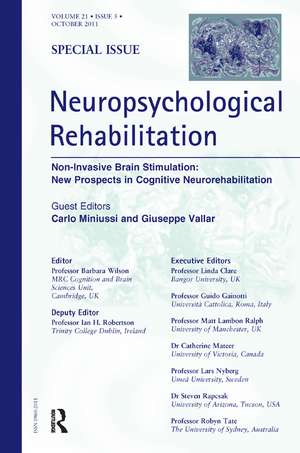Non-Invasive Brain Stimulation: New Prospects in Cognitive Neurorehabilitation: Special Issues of Neuropsychological Rehabilitation
Editat de Carlo Miniussi, Giuseppe Vallaren Limba Engleză Paperback – 5 iul 2019
Several investigations emphasise the fact that interacting with neural activity, by means of cortical stimulation, can affect cognitive performance. A number of studies have reported enhanced performance in specific cognitive tasks in patients with several types of neurological disease, after receiving Non Invasive Brain Stimulation (NIBS) to specific cortical areas, namely: Transcranial Magnetic Stimulation, and transcranial Electrical Stimulation. In general, the evidence highlights the possibility of inducing changes in cortical excitability, which, in turn, may lead to a plastic reorganization of dysfunctional networks, responsible for the impaired cognitive functions. Despite these advances, a number of important questions remain open, regarding the use of stimulation techniques in cognitive rehabilitation.
This special issue puts together international leading experts in the field, to review and discuss recent advances as to whether NIBS techniques alone, or combined with behavioural cognitive rehabilitation, can lead to performance enhancements, and why. The issue is timely and promises to have a huge impact across many domains of clinical and basic neuroscience.
Preț: 436.14 lei
Nou
Puncte Express: 654
Preț estimativ în valută:
83.45€ • 87.37$ • 69.05£
83.45€ • 87.37$ • 69.05£
Carte tipărită la comandă
Livrare economică 05-19 aprilie
Preluare comenzi: 021 569.72.76
Specificații
ISBN-13: 9781138381193
ISBN-10: 1138381195
Pagini: 216
Dimensiuni: 156 x 234 x 12 mm
Greutate: 0.45 kg
Ediția:1
Editura: Taylor & Francis
Colecția Psychology Press
Seria Special Issues of Neuropsychological Rehabilitation
Locul publicării:Oxford, United Kingdom
ISBN-10: 1138381195
Pagini: 216
Dimensiuni: 156 x 234 x 12 mm
Greutate: 0.45 kg
Ediția:1
Editura: Taylor & Francis
Colecția Psychology Press
Seria Special Issues of Neuropsychological Rehabilitation
Locul publicării:Oxford, United Kingdom
Cuprins
C. Miniussi & G. Vallar, Brain Stimulation and Behavioural Cognitive Rehabilitation: a New Tool for Neurorehabilitation? A Foreword. G. Berlucchi, Brain Plasticity and Cognitive Neurorehabilitation. C. Miniussi, P.M Rossini, Transcranial Magnetic Stimulation in Cognitive Rehabilitation. W. Paulus, Transcranial Electrical Stimulation (tES - tDCS; tRNS, tACS) Methods. G. Vallar, N. Bolognini, Behavioural Facilitation Following Brain Stimulation: Implications for Neurorehabilitation. S.Tanaka, M. Sandrini, L.G. Cohen, Modulation of Motor Learning and Memory Formation by Non-invasive Cortical Stimulation of the Pimary Motor Cotex. M.D. Hesse, R. Sparing, G.R., Fink, Ameliorating Spatial Neglect with Non-invasive Bain Stimulation: From Pathophysiological Concepts to Novel Treatment Strategies. P.S. Boggio, C.A.Valasek, C. Campanhã, A.C.A. Giglio, N.I. Baptista, O.M. Lapenta, F. Fregni, Non-invasive Brain Stimulation to Assess and Modulate Neuroplasticity in Alzheimer’s Disease. M. Cotelli, A. Fertonani, A. Miozzo, S. Rosini, R. Manenti, A. Padovani, A.I. Ansaldo, S.F Cappa, C. Miniussi, Anomia Training and Brain Stimulation in Chronic Aphasia. S.F. Cappa, The Neural Basis of Aphasia Rehabilitation: Evidence from Neuroimaging and Neurostimulation. D.T. Stuss, The Future of Cognitive Neurorehabilitation.
Descriere
This Special Issues includes state-of-the art reviews, written by research leaders, of Non-Invasive Brain-Stimulation (NIBS) techniques for the cognitive rehabilitation of disorders of memory, language, perception, attention and executive functions. Enhancing cognitive functions and the effects of concurrent cognitive rehabilitation through NIBS is a promising field for translational and clinical research. Transcranial Magnetic Stimulation (TMS), and transcranial Electrical Stimulation (tES), modulate behaviour through effects on neural excitability, and plasticity. tES is a low-cost and safe method, that can be used in a variety of conditions, both in the hospital and home-based. The Special Issue is a highly recommended reading for neurologists and psychologists.








